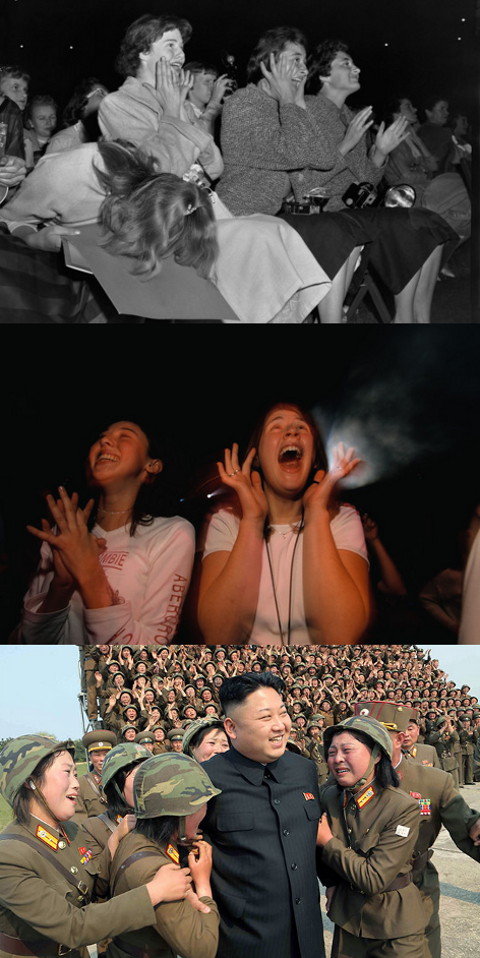Why Girls Went So Crazy

Die weinenen Frauen, die den Führer Nordkoreas umklammern, finde ich gar nicht komisch. Ich versuche eher zu verstehen, warum das für uns so seltsam aussieht – weil wir es nicht gewohnt sind, dass Groupies von Popstars Uniformen tragen? (Andere Version)
Gehen wir die Sache rational und wissenschaftlich an. The Conversation schreibt:
Lots of tears and lots of screaming. But what can neuroscience tell us about what might have been happening in their brains? (..) Typically, we equate crying with sadness and fainting with illness. The truth is, our brains are actually pretty dumb, and any sudden, strong emotion – from happiness to relief to stress – can elicit these vulnerable physical reactions.
Nun gut, auf „pretty dumb“ wäre ich auch selbst gekommen. SCNR.
Acting via the hypothalamus, the sympathetic nervous system is designed to mobilise the body during times of stress. It’s why our heart rate quickens, why we sweat, why we feel ready to run. The parasympathetic nervous system, on the other hand, essentially calms us back down. The parasympathetic nervous system does something funny, too. Connected to our lacrimal glands (better known as tear ducts), activation of parasympathetic receptors by the neurotransmitter acetylcholine results in tear production. So for those fans relieved to finally see their Fab Four, tears were commonplace. („Viele kognitive Prozesse sind an Acetylcholin als Botenstoff gebunden.“)
Das „Wall Street Journal“ befasst sich („Inside the Brains of Bieber Fans“) ebenfalls mit dem Phänomen und résumiert: „Neuroscience Offers Explanation; a ‚Safe‘ Infatuation“. Also eine Art „geschütztes“ Ausflippen, um in pubertärem Alter die eigenen Grenzen zu erfahren. „It primarily affects preteen and teen girls“.
Hearing familiar, favorite music stimulates the release of dopamine, the neurotransmitter involved in pleasure and addiction, providing the same rush as eating chocolate or that winning does for a compulsive gambler.
Nur dass es nicht Musik sein muss, sondern jedweder Reiz, der in der jeweiligen Kultur als Auslöser definiert worden ist, also zum Beispiel auch der Anblick eines „geliebten und größten anzunehmenden Führers“.
…adolescent girls are far more likely to become infatuated with pop stars, experts say, because they are awakening to romantic and sexual feelings that are both intoxicating and scary.
Well said. Intoxicating and scary. Ich vermute auch, dass die abgebildeten Frauen ziemlich jung sind und nicht viel Gelegenheit finden, „romantic and sexual feelings“ auszuleben.